May 17, 2025 | 21:17 GMT +7
May 17, 2025 | 21:17 GMT +7
Hotline: 0913.378.918
May 17, 2025 | 21:17 GMT +7
Hotline: 0913.378.918
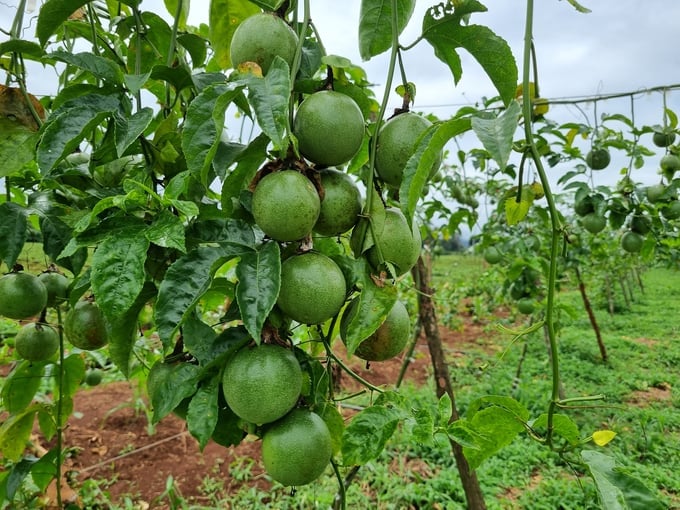
Diseases are threatening passion fruit gardens everywhere. Photo: Tuan Anh.
Ms. Nguyen Khanh Huyen, Director of Gia Lai Biological Agriculture Joint Stock Company, said that type 1 passion fruit exported to Europe still maintains high prices but is in serious shortage. Meanwhile, passion fruit extract is in surplus. People have rushed to grow lemons without planning and long-term investment, so the quality of lemons is low, causing prices to plummet.
Ms. Huyen gives an example: 1 hectare of passion fruit yields 40 tons. If cultivated organically, it can reach 30% of the quantity required for export to Europe and 30% for export to China and Thailand, and the rest is extracted. This will greatly limit the amount of fruit products supplied to domestic factories, reduce consumption pressure and maintain prices. However, most people in Gia Lai province mainly use traditional methods to cultivate passion fruit.
Without technical procedures, this has led to lemon gardens being devastated by diseases such as leaf curl virus, powdery mildew, and many fungal infections.
In Chu Pah district (Gia Lai province), powdery mildew disease is raging on a large scale in people’s passion fruit gardens. At any lemon garden, people shake their heads in frustration with powdery mildew.
Mr. Nguyen Van Tai’s 1-hectare passion fruit garden in Village 1, Ia Ka Commune (Chu Pah District), has not been harvested but has been attacked by powdery mildew disease. Mr. Tai said that his family pays great attention to the fruit garden, from fertilization to periodic spraying. However, powdery mildew is contagious without any specific treatment, making the lemon increasingly shriveled.
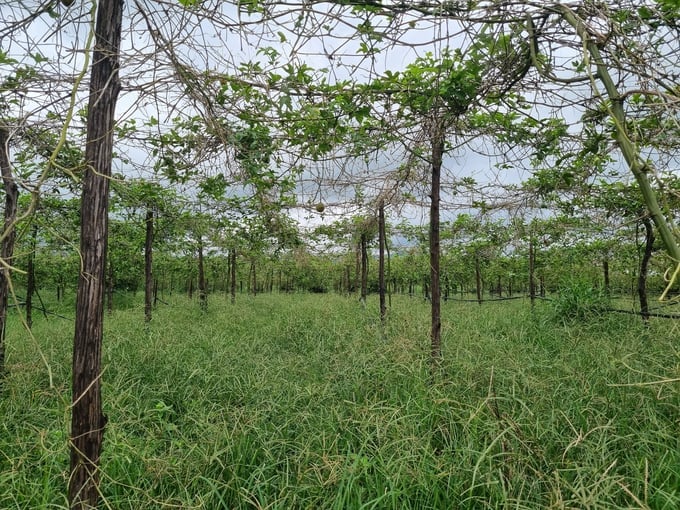
Many passion fruit gardens are diseased, and people neglect to care for them. Photo: Tuan Anh.
In more than two years of growing passion fruit, Mr. Tai’s knowledge comes mostly from mass media or fellow fảmers. Without the necessary skills, he cannot cultivate high-quality passion fruits and has to sell his products at low prices. This is also the common situation of many households growing passion fruit following the trend in this locality. “The family had already planted new trees, so they had to go with the flow, but with current prices, many households are considering dismantling passion fruit gardens,” Mr. Tai shared.
While harvesting her 1-hectare garden, Ms. Khong Thi La (Bui village, Ia Ka commune) said: This year’s crop seems to be a complete failure because various diseases attack passion fruits. After the powdery mildew disease ended, the crab eye fungus spread and the passion fruit garden withered more and more.
According to Ms. La, powdery mildew spreads throughout the region, and no farmer who grows passion fruit can avoid it. In addition, seed quality has not been guaranteed in recent years, which is also the cause of epidemics. Poor quality varieties may already carry pathogens, so as soon as they are planted, they show signs of disease, despite farmers’ care.
“The family took very good care of our trees. We mainly use organic fertilizer but could not save the passion fruit garden. When we discovered that we were sick, we also used all kinds of treatment – from chemical to biological drugs – but the passion fruit kept shrinking. It has only been three crops, but most trees have withered,” Ms. La said sadly.
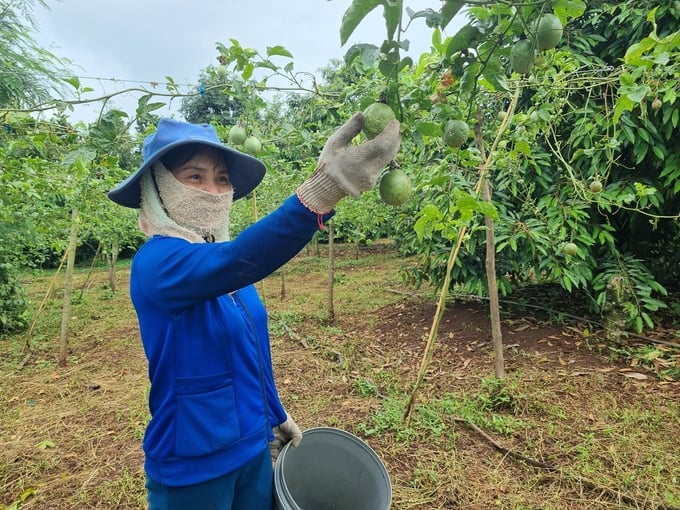
Ms. Khong Thi La (Bui village, Ia Ka commune, Chu Pah district) was fed up because her passion fruit garden was shriveled. Photo: Tuan Anh.
The low price of lemons combined with the raging epidemic has made people in the area very discouraged from cultivating passion fruit trees. Many households plan to abandon all passion fruit trees and switch to growing other trees.
Mr. Tran Xuan Khai, Director of the Department of Crop Production and Plant Protection of Gia Lai province, said that the unit has recently coordinated with the districts’ agricultural service centers to investigate areas infected with pests. They hope to promptly guide people and synchronously implement prevention measures according to the instructions of specialized agencies, avoiding widespread spread.
In addition, the Sub-department has strengthened the inspection of establishments selling plant varieties, fertilizers, pesticides and other agricultural supplies in the locality. This will limit passion fruit varieties from being infected in the future, preventing pests and poor-quality agricultural materials that have damaged people.
For many months, the weather in Gia Lai has been too harsh, with constant rain and little sunlight, leading to many harmful diseases. Fruits in the growing stage are vulnerable to betel leaf fungus, crab eyes, etc., causing considerable damage to growers.
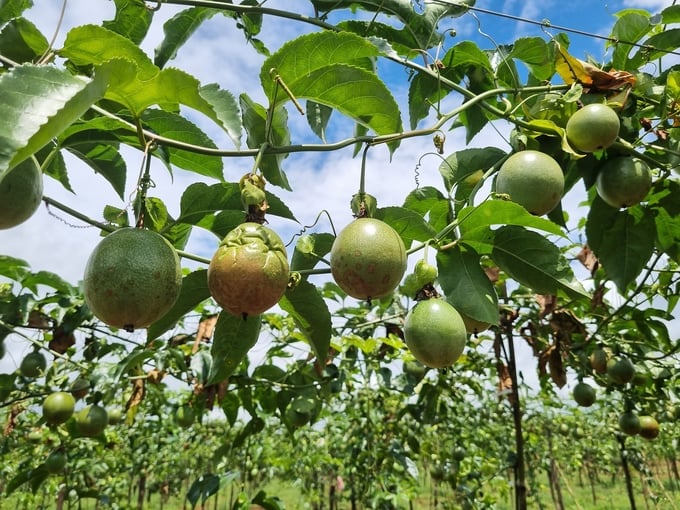
Prolonged rains cause passion fruit to be attacked by various fungal diseases. Photo: Tuan Anh.
The prolonged rain in recent times paints a gray color to the passion fruit-growing area in the Ia Grai district, making it even more gloomy. Mr. Vo Thanh Son (Chu Hau 6 village, Ia Ba commune, Ia Grai district) said that all of his family is being attacked by betel nut fungus. He hoped it would be sunny enough to spray treatment to save the garden.
Mr. Son admitted that in recent times, the prolonged rains combined with the low price of passion fruit made his family not bother to take care of it, leading to an inevitable disease. “In the future, the family will try to take care of the garden again, but this disease attack will cause even more damage,” Mr. Son shared.
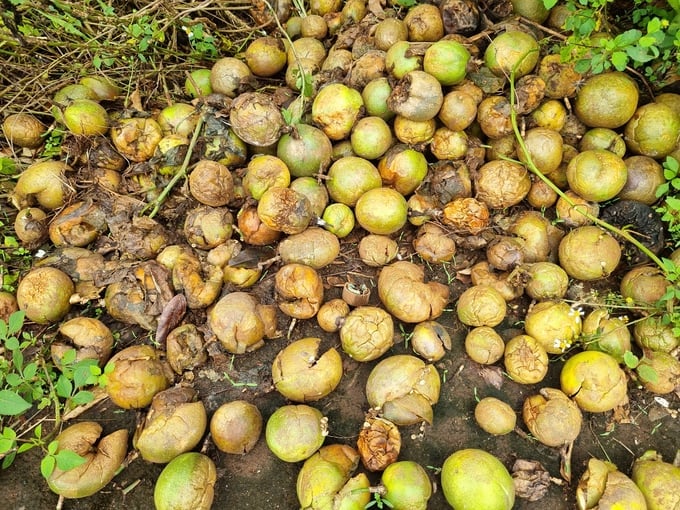
Fungal diseases damage many passion fruit gardens. Photo: Tuan Anh.
Adverse weather in Gia Lai recently has damaged not only passion fruit trees but also many other crops. Gia Lai Provincial Department of Crop Production and Plant Protection has advised people to apply integrated plant health management (IPHM) to prevent harmful pests and diseases on passion fruit trees and other crops. At the same time, farmers should use seedlings from reputable production facilities with clear origins.
In November 2023, Vietnam Agriculture Newspaper, the Department of Agriculture and Rural Development of Gia Lai province and related units under the Ministry of Agriculture and Rural Development will coordinately organize the Forum “Identifying the current situation of passion fruit production, processing and consumption, and Solutions to develop the sustainable passion fruit industry.” Within the framework of the Forum, the Campaign Committee of Gia Lai Province Passion Fruit Association will be launched. The forum will be livestreamed in Gia Lai province and broadcast to about 500 places nationwide.
Translated by Quynh Chi

(VAN) Muong Nhe Nature Reserve hopes that being upgraded to a national park will lay the foundation for forest protection efforts to be carried out in a systematic, modern, and sustainable manner.
/2025/05/16/3923-2-171845_52.jpg)
(VAN) Lower costs, higher yields, and improved soil quality are outstanding benefits that soybeans bring when integrated into the crop rotation system.

(VAN) The 'For a Green National Environment' programme aims to promote a green lifestyle, support businesses in implementing ESG practices, and turn Net Zero commitments into concrete actions.

(VAN) Cold-barn systems efficiently manage environmental and temperature conditions, which aids in the prevention of respiratory diseases in pigs and protects them from the vectors that transmit African swine fevers.

(VAN) To tackle challenges, the project 'Addressing key technical bottlenecks in the grouper supply chain in Vietnam' has been underway since 2024.

(VAN) The project 'Disease-Resilient and Sustainable Cassava Production Systems in the Mekong Region', funded by the Australian Center for International Agricultural Research (ACIAR), is being implemented from 2024 to 2028.

(VAN) Data from 10,000 farming households will help professionalize production organization and support the implementation of the One Million Hectares Program for High-Quality, Low-Emission Rice Cultivation.